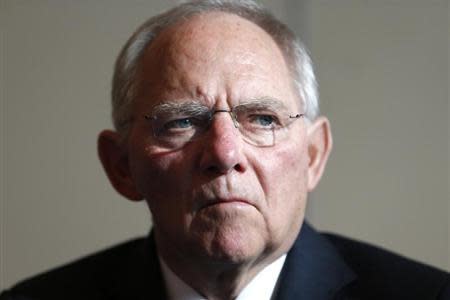Germany's Schaeuble signals support for euro zone parliament

By John O'Donnell
BRUSSELS (Reuters) - Germany's finance minister said on Monday he was open to the creation of a separate European parliament for countries using the euro, a step that could deepen divisions within the European Union.
Wolfgang Schaeuble's comments, made during a visit to Brussels, challenge the very foundations of the European Union where lawmaking for all 28 nations is by the bloc's current parliament.
Splitting that body, critics believe, would represent a dismantling of one of Europe's biggest symbols of unity.
But Schaeuble said a separate parliament for the 18 countries in the euro zone would allow the smaller group to integrate more closely.
"We need to enhance European integration in an intelligent way and enshrine it by making changes to the (EU) treaties," Schaeuble said, reiterating the need for far-reaching legal changes to underpin economic reforms to support the currency.
"I can imagine there being a euro zone parliament," he told a gathering organised by the European People's Party, a group representing centre-right political parties.
In making his case, Schaeuble referred to a desire in euro zone members France and Germany that "the European parliament should be involved more effectively in euro zone decisions".
"It would be relatively easy to achieve this by creating a euro zone parliament consisting of members of parliament from euro zone countries," Schaeuble said.
EUROSCEPTICS
His comments are likely to receive a frosty reception in the European Parliament, whose more than 700 members are preparing for elections this May.
They have already objected to attempts to forge an intergovernmental agreement for parts of the banking union, a scheme to unify the euro zone's tackling of problem banks.
The elections are expected to see an influx of eurosceptic groups, as an economic slump fuels dissatisfaction with Brussels among the wider population.
That in turn could make it more difficult to finalise laws, which require agreement between both EU countries and members of its parliament.
Sweden's Finance Minister Anders Borg, whose country is outside the euro, said he was sceptical about Schaeuble's suggestion and that it would do little to address a widespread lack of trust in Brussels.
Pushing through such a change could also prove risky if it prompted the United Kingdom, outside the euro and already questioning whether it should stay in the European Union, to renegotiate its position.
(Reporting By John O'Donnell, editing by Alister Doyle)


